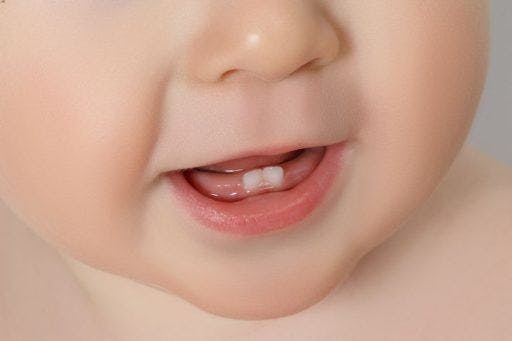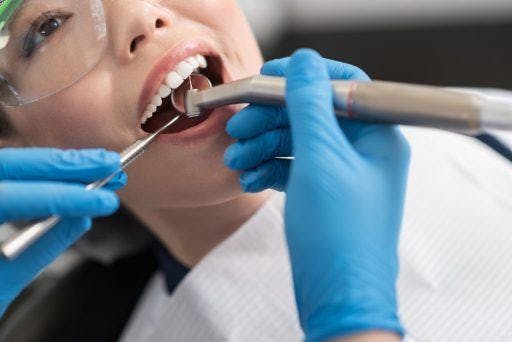As you age, your dental health needs will evolve. But if you practise good oral care habits and stick with them, there’s less you’ll need to change as you go through the different life stages. Start by following these dental care tips: they’ll help keep your teeth, gums, and mouth healthy from ages zero to 100 (and beyond!).
Dental care tips for children

Establishing excellent oral hygiene habits, like daily brushing and interdental cleaning (cleaning between teeth), at a young age is essential. Once your child has two teeth that touch, they should learn to floss. They’ll usually need help until they’re age 10. But if they keep at it, flossing should be a breeze by the time they’re in their teens.
1. Wipe babies’ gums before teething.
Most infants are toothless until about three months old, so there isn’t much to brush. Instead, the Australian Dental Association (ADA) recommends gently wiping their gums with a soft, clean cloth to remove cavity-causing bacteria and sugars.
2. Brush baby teeth as soon as they appear.
Teething differs from child to child. Some may develop their first tooth at six months, while others might have to wait longer. In any case, tend to your little one’s teeth as soon as they erupt. Brush them twice a day with plain water – fluoride toothpaste isn’t necessary yet at this stage.
3. Bring your child to the dentist before their first birthday.
Schedule a trip to the dentist no later than your baby’s first birthday, even if their teeth haven’t fully emerged yet. Your dentist can spot early signs of decay and treat cavities before they worsen. You can also ask them about using fluoride varnish or toothpaste on your infant’s teeth.
4. Monitor their brushing to ensure proper technique.
According to the International Journal of Paediatric Dentistry, children develop the fine motor skills needed for proper brushing once they enter primary school (from six years old). But it’s best to continue watching them past this age to ensure proper technique.
Better yet, brush with them so they can model your behaviour! Remind them to use a pea-sized amount of toothpaste, brush for at least two minutes, and spit out the residue instead of swallowing.
5. Curb damaging oral habits early.
Poor or incorrect myofunctional (oral) habits can negatively impact the development of mouth muscles. These include thumb-sucking, tongue thrusting, and prolonged pacifier or bottle use. When these behaviours persist, they can lead to misaligned permanent teeth.
Dental care tips for teenagers

Children who know to brush and floss properly will eventually grow into teens who are diligent about those habits, too. But there are other oral hygiene rules that parents can call on. These include replacing toothbrushes every three months, addressing signs of tooth decay and gum disease early, and maintaining a balanced diet. Teens who build these habits are likely to bring them to adulthood.
1. Limit intake of sugary snacks, sodas, and acids.
What is the most common dental health problem among teenagers? Cavities! It’s no secret that teenagers love junk food, but all those sticky candies, fizzy drinks, and crisps are the worst culprits behind tooth decay. Sugars, starches, and carbs create acids that attack enamel and weaken dentition.
2. Use protective gear for risky sports.
Basketball, soccer, and lacrosse are some of the most dangerous sports for your teeth. They’re also popular extracurriculars for active teens. The ADA strongly advises that anyone who plays risky sports wear a mouthguard during training and on game days.
Teens undergoing orthodontic treatment with traditional braces should consult their dentist about specialty mouthguards to wear on top. For removable appliances, the Australian Society of Orthodontics (ASO) recommends taking them off during contact sports before putting your mouthguard on.
3. Invest in orthodontic treatment.
As the ASO explains, “Treatment for this age group is very efficient and more cost-effective.” Since teenagers are still rapidly growing, their jaws are malleable and easier to adjust. It’s the best time to treat misaligned teeth! Traditional, metal-wired braces are the standard option, but they aren’t the most subtle.
For a more discreet and comfortable alternative, consider ClearCorrect aligners. These removable appliances are made with proprietary ClearQuartz, a tri-layer plastic that moves your teeth with minimal discomfort. The bonus? They look nearly invisible, nipping every late adolescent’s self-consciousness in the bud.
Dental care tips for adults

As an adult, you should continue to brush and floss daily, limit foods that wreak havoc on teeth, and manage burgeoning oral health conditions. And if you put off orthodontic treatment, it’s not too late – aligner therapy is for everybody and all ages. Here are a few other things to keep in mind.
1. Keep your dentist appointments.
The easiest way to transform your oral and dental health is to visit your dentist regularly. The ADA recommends going in for checkups every six to 12 months. Frequency will also depend on the overall health of your teeth, so ask your treating dentist for a schedule that works for you.
2. Address tooth loss right away.
A missing tooth isn’t simply an aesthetic concern – it can make your gums more vulnerable to disease. Losing multiple teeth can also lead to bite issues, impact your speech, and cause other teeth to shift.
3. Avoid smoking and limit alcohol intake.
Indulging in harmful substances like tobacco comes with serious consequences for your overall health. Heavy drinking and smoking can increase the likelihood of developing tooth decay, gum disease, and certain cancers.
Dental care tips for older adults

Adults over 65 are at higher risk for developing oral health problems. The National Dental Care lists dry mouth, root decay, and teeth sensitivity as conditions that heavily impact older adults. So, besides the usual good habits, what else can you do to keep your teeth and gums in fighting shape?
1. Watch for changes in the mouth.
It’s wise not to brush off unusual pain and discomfort! Always note your symptoms, see your dentist at least twice a year (or more, as needed), and address issues immediately. Early detection and treatment will have you flashing a healthy set of pearly whites in your golden years.
2. Treat teeth sensitivity and dry mouth.
Age-related gum recession can expose the tooth root, leading to sensitive teeth. Experts recommend using an anti-sensitivity toothpaste to relieve symptoms. Meanwhile, certain medications can cause dry mouth, which makes consistent water intake even more essential.
3. Consider switching to an electric toothbrush.
Seniors with reduced dexterity can benefit from switching to a soft-bristled electric toothbrush with a comfortable grip. They effectively clean away plaque without requiring much work on the user’s end.
Safeguarding your dental health is a lifetime commitment. The sooner you establish proper oral care habits, the healthier your teeth and gums will be in later life.
All it takes is a little dental health care, from regular visits to your dentists to twice-a-day brushing and flossing and you’ll have a healthy set of teeth at every stage of your life. You won’t regret it!
References:
Australian Dental Association. (n.d.). Sports mouthguards. Teeth.org.au.
Australian Dental Association. (n.d.). Baby and toddler oral health. Teeth.org.au.
Children’s Oral Health | Basics | Children’s Oral Health | Division of Oral Health | CDC. (n.d.).
Chua, D. R., Hu, S., Sim, Y. F., Lim, W., Lai, B. W. P., & Hong, C. (2022). At what age do children have the motor development to adequately brush their teeth? International Journal of Paediatric Dentistry, 32(4), 598–606.
Department of Health & Human Services. (n.d.-g). Teeth development in children. Better Health Channel.
Department of Health & Human Services. (n.d.-h). Toothbrushing – children 0-6 years. Better Health Channel.
Solan, M. (2022). The senior’s guide to dental care. Harvard Health.
Stanford Medicine Children’s Health. (n.d.). Flossing and Children. Stanfordchildrens.org.
The Australian Society of Orthodontics. (2023, March 8). Hobbies & Braces: Do You Need a Mouthguard for braces? Orthodontics Australia.
The Importance of Oral Health For Older Australians. (2021, June 10). National Dental Care / DB Dental.



